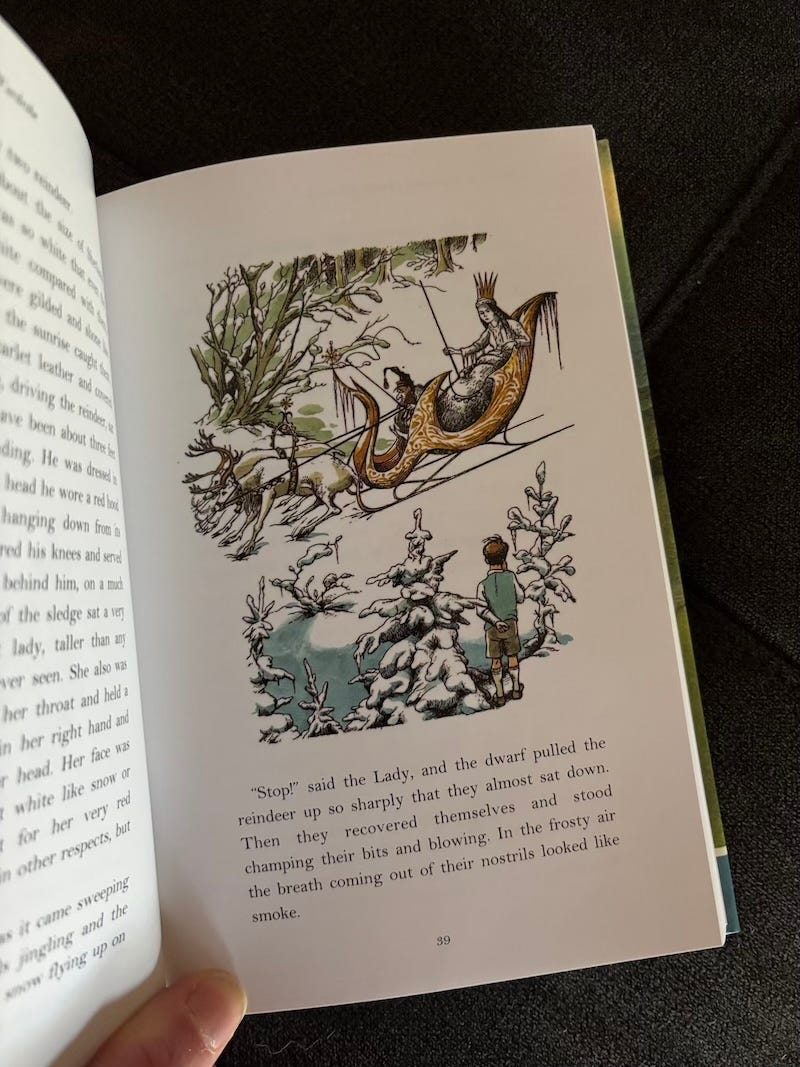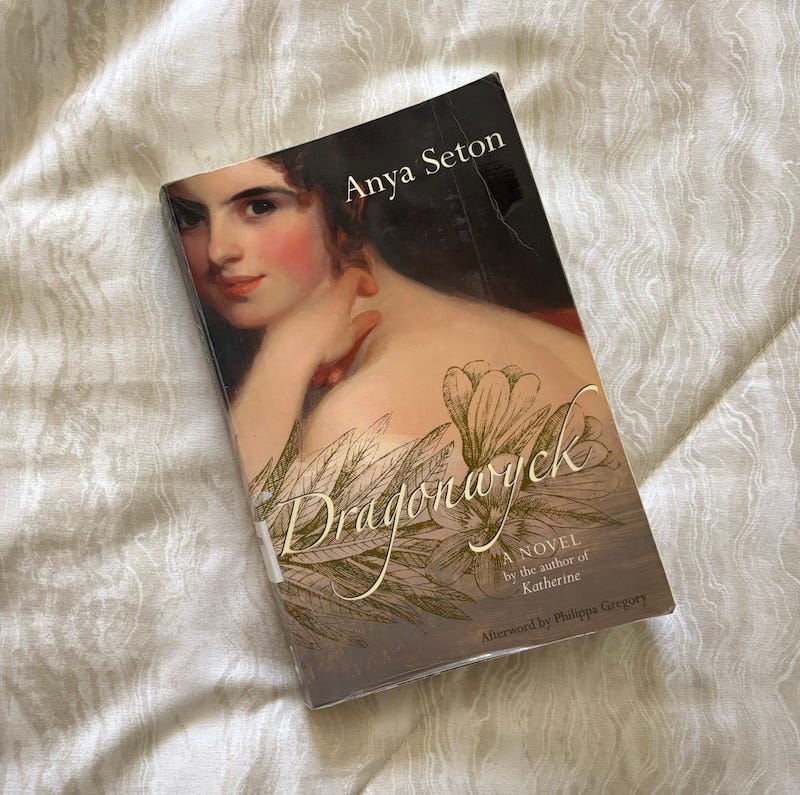When a story makes you want what's wrong
Into the Woods, The Hunger Games, and Turkish Delight (plus the winners)
Saturday Morning Serial is the weekend section of Library Binding. It’s a personal corner where I publish short stories, book reviews, and literary musings.
Thank you to everyone who took the survey! I loved reading your insights, and I’m looking forward to sharing what I learned.
Congratulations to Donna S., Janice H., and Robyn V., winners of the mystery packet.
🎁 As a small token of thanks to everyone, here’s a goofy game for your reading year.
Last month, our local high school performed Into the Woods. More than a few parents raised their eyebrows because we’re a fairly religious little town, and Into the Woods has that crude scene where Prince Charming seduces the Baker’s Wife. You know the one.
That part of the play always makes me squirm and fidget in my seat, and it was even weirder watching a bunch of teenagers perform it.
Seeing our little stage production inspired me to rewatch the 2014 film1, with Emily Blunt as the Baker’s Wife and Chris Pine as Prince Charming. There are several different ways to stage this scene—I’ve seen a few raunchy ones—and the filmmakers, keeping it PG, made a deliberate decision to play up the desire vs. duty dilemma.
They put these two incredibly attractive actors together and allowed sparks to fly. They made sure sparks flew. The physicality of the scene—a swirl of caresses, open mouths, and rumpled hair—ups the heat. It’s designed to make the audience feel conflicted—just a little.
On the one hand, we know Prince Charming is a toolbag and the Baker’s Wife should run far, far away. On the other hand, we feel the powerful pull of carnal wish fulfillment. We know better, but if we allow our judgment to slip an inch or two, then there’s a tiny part of us—an immature and undisciplined part—that wants the Baker’s Wife to capitulate.
Our emotions become tangled, and our judgment becomes (forgive me) lost in the woods.
I haven’t spent a lot of time thinking about Into the Woods. I have no special knowledge beyond my personal reaction as an audience member. But, I believe the story is asking us to want what’s wrong. On purpose. For just one short minute.
Why? To confront us with ourselves. To remind us that we’re human, and sometimes humans get mixed up and take the wrong path.
And, when we do, there’s a price to pay.
The Hunger Games: Cheering for the win (or, the kill)
I recently read the latest Hunger Games prequel by Suzanne Collins, Sunrise on the Reaping, which chronicles Haymitch’s backstory.2
Like in HG1 and 2, Suzanne Collins sets up a perfectly paced first half in which she reaps a child and preps him for the Games. She easily—too easily—turns me into a Capital bear-baiter. I cheer when my tribute cleans up nice, makes alliances, nails the interview, and schmoozes the sponsors. Go District 12!
But then (as with HG1 and 2) the second half is a swift slap of reality. “I take it all back! I don’t want my tribute to win! I’d rather he die with dignity. I don’t want him to kill anyone because he’ll spend the rest of his life running from the guilt.”
When the chocolate pudding hits the fan, I realize, oh, I was duped. There are no winners in the Hunger Games. I know that. How could I have forgotten? I played right into the game by grabbing my popcorn and callously watching the kids die. Am I made of stone—what’s wrong with me?
(Side note: The films don’t give the same “slap of reality” as the books, in my opinion.)
Put down the Turkish Delight, Edmund
When the White Witch glides up in her sleigh in the dead of a Narnian winter, we, as readers, quickly perceive that she is evil. When Edmund trusts her and agrees to do her bidding, we cluck our tongues. She can’t fool us.
C. S. Lewis never intended her to. I experience no internal struggle as a reader, where one part of me hopes that Edmund will reject her offer and another part hopes he’ll take her up on it because she’s so irresistible.
Instead, we watch (from above) as an untested young man faces a “serpent heart hid with a flowering face” and fails the exam. The effect is no less emotional despite being more clear cut.
How could anyone ever _______?
I just finished Dragonwyck by Anya Seton. This book does something similar to Into the Woods—tempting us to want what’s wrong.
Young Miranda longs to leave the rustic farm of her childhood for the luxuries of city life—and she gets her big chance when a distant cousin (rich and devilishly handsome) invites her to stay with him and his wife and their daughter at their estate in New York. You can guess where this is going, right?
We see sparks fly between Miranda and her cousin, Nicholas, who is unhappy in his marriage. Adultery is wrong! This guy, Nicholas, is not a good person! He’s mysterious and intellectual and powerful—but not good! Run, Miranda! Except…there is an undeniably powerful force drawing the two together, and the collision feels inevitable.
Page by page, the author plants alternating seeds of desire and doubt, sowing them in equal measure, and by the midpoint, we know it’s wrong, but a very honest part of ourselves wants to see Miranda and Nicholas go through with it because…we are horrid sinners, apparently.
It’s unsettling when an author gets me to the point where I’m conflicted about clearly immoral behavior. In Dragonwyck, the author uses FACTS to make it abundantly clear that Nicholas is bad news. But she uses EMOTION to make him seem like Miranda’s inescapable destiny.
I’m set in my ways when it comes to right and wrong, so when an author pokes me out of those well-worn tracks, I don’t like it.
I find it easy to love my husband because he’s fantastic. But what if he wasn’t? It’s easy for me to live an honest, simple lifestyle because it suits me. But what if it chafed me? What if I found myself doing something I swore I’d never do?
That’s not a life I want to live. But it is a book I want to read—because it’s messy and unbearable.
The price
The Baker’s Wife dies. Miranda, almost.
Stepping off the path leads you into the woods where danger will bite you. One thing I appreciate about these stories is that they don’t (completely) let the characters off the hook. The characters play a losing game, and they knew it going in. We knew it, too. And it plays out the way we knew it would, even though we felt that gross, fleshy desire to roll the dice despite our better judgment.
I take issue with stories that make us want what’s wrong and then never correct us for it. But I can tolerate a story that shows me the bloody wound and says, “You wanted this, remember?” I can welcome a story that depicts how cheap and hollow that immoral desire turned out to be after the lust-fog burned off, leaving only regret, shame, and fear—a high price.
I don’t lie, cheat, or steal, but I know where my moral failures lurk, grinning in the dark. They pain me because, in many cases, I, myself, opened the door through which they crept.
That is why I find myself appreciating these unsettling stories because they shore up my moral muscle memory so that I’m a little wiser when I face my next crossroads, however big or small.3
But the natural man receiveth not the things of the Spirit of God: for they are foolishness unto him: neither can he know them, because they are spiritually discerned. –1 Cor. 2:14
I’ll leave you with one irresistible indulgence—have you ever owned one of these?
Your devoted,
Michelle
It only took me 3.5 weeks to watch the whole thing in 10-minute stints. If you know the secret to watching a movie in one sitting, let me know.
I’ve read all the HG books so far, so I figured I’d be a completist. Even though the first-person, present-tense POV irritates me, I do appreciate other aspects of these books.
Thankfully, I don’t have to rely solely on literature for this—ha! And, even though I must face the earthly consequences of my mistakes, I don’t have to face the eternal ones. That price has been paid in full.








I appreciate your observations on these stories—that in the very skill of convincing us wrong might be right, the authors show us our own contrary hearts. And yeah, I agree—it only works if you also see the fallout. I’m still scraping some of the other kind off my skin!
This almost makes me feel a little icky as a reader now. 😆 For me, the icky part is more often related to moments when a "good" character deals out "justice" in his own way. There's a book in which one of my favorite characters--a generally good, upstanding, honorable guy--murders a character who is a slimy traitor, and when I read the scene there was that part of me that celebrated, even though I knew it wasn't right or good. But the author did a good job of making me want that guy dead.